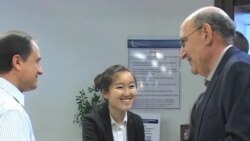LOS ANGELES, CALIFORNIA —
Mosques from San Diego to Los Angeles opened their doors to people of all faiths on Sunday. Now in its 12th year, Open Mosque Day is sponsored by the Islamic Shura Council of Southern California. The event aims to dispel Muslim stereotypes and Islamophobia that still persist in the U.S. more than a decade after the September 11, 2001 terrorist attacks.
On a Sunday, when Christians attend church, Muslims invited the public to step inside their place of worship to take a tour and ask questions. Ahmed Asim Buyuksoy is the Director of Religious Affairs at The Islamic Center of Southern California.
“The whole purpose of Open Mosque Day is to introduce ourselves and our community, our religion, our culture to other brothers and sisters from different faiths and backgrounds,” said Buyuksoy.
Glorianna Pionati heard about Open Mosque Day through her church and came to visit.
“I didn’t know what to expect, but I was pleasantly surprised to see people milling around and really welcoming, lovely smiling faces,” said Pionati.
A visitor who only identified himself as Steve was here with a purpose.
“I just want to discuss some of the evils within Islam, which there are numerous,” claims Steve. "The Quran, in fact, gives justification, in fact sanctification, for hatred, violence and murder.”
Amaani Shams is Muslim American.
“The ignorance is still around and it’s very unfortunate,” said Shams. "I feel like America overall has grown in its understanding of Islamic practice and humans that identify as Muslims, but we still have those who encourage the easy hatred towards Islamic communities.”
Mahmoud Abdel-Baset says Islamophobia among some Americans is perpetuated by the media.
“They are influenced by what they see in the public media. And there is lots of misinformation,” said Abdel-Baset. "There are lots of stereotypes. It puts the pressure on us to present ourselves for what we are, not what people think about us.”
The Islamic Center of Southern California member Saleh Kholaki says American Muslims have moderate Islamic ideology and are different from more extreme Muslims in some other countries. He says there are more similarities than differences between Muslims and non-Muslims in the United States.
“I’m like anybody else. I’m a different religion, but I have the same interests, same values and the same family values that we share with the community,” said Kholaki.
Muslims such as Kholaki say they hope dialogue and events like Open Mosque Day will create more understanding and dispel misconceptions about what it means to be Muslim in America.
On a Sunday, when Christians attend church, Muslims invited the public to step inside their place of worship to take a tour and ask questions. Ahmed Asim Buyuksoy is the Director of Religious Affairs at The Islamic Center of Southern California.
“The whole purpose of Open Mosque Day is to introduce ourselves and our community, our religion, our culture to other brothers and sisters from different faiths and backgrounds,” said Buyuksoy.
Glorianna Pionati heard about Open Mosque Day through her church and came to visit.
“I didn’t know what to expect, but I was pleasantly surprised to see people milling around and really welcoming, lovely smiling faces,” said Pionati.
A visitor who only identified himself as Steve was here with a purpose.
“I just want to discuss some of the evils within Islam, which there are numerous,” claims Steve. "The Quran, in fact, gives justification, in fact sanctification, for hatred, violence and murder.”
Amaani Shams is Muslim American.
“The ignorance is still around and it’s very unfortunate,” said Shams. "I feel like America overall has grown in its understanding of Islamic practice and humans that identify as Muslims, but we still have those who encourage the easy hatred towards Islamic communities.”
Mahmoud Abdel-Baset says Islamophobia among some Americans is perpetuated by the media.
“They are influenced by what they see in the public media. And there is lots of misinformation,” said Abdel-Baset. "There are lots of stereotypes. It puts the pressure on us to present ourselves for what we are, not what people think about us.”
The Islamic Center of Southern California member Saleh Kholaki says American Muslims have moderate Islamic ideology and are different from more extreme Muslims in some other countries. He says there are more similarities than differences between Muslims and non-Muslims in the United States.
“I’m like anybody else. I’m a different religion, but I have the same interests, same values and the same family values that we share with the community,” said Kholaki.
Muslims such as Kholaki say they hope dialogue and events like Open Mosque Day will create more understanding and dispel misconceptions about what it means to be Muslim in America.





